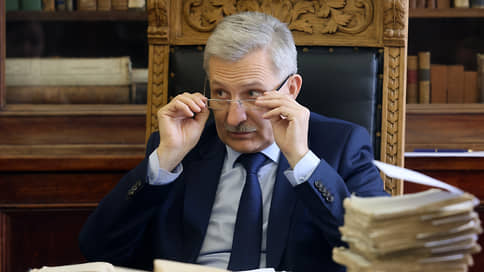“In fact, he created Russian pedagogy” – Kommersant
[ad_1]

A deluxe edition of a collection of reprints of selected articles by Konstantin Ushinsky will be presented at the Red Square Book Festival, which opens on June 2, and then at the St. Petersburg International Economic Forum. The collection is published as part of the Year of the Teacher and Mentor by the publishing house of the Russian Pedagogical University named after Herzen under the general editorship of the Minister of Education Sergey Kravtsov and is dedicated to the 200th anniversary of one of the founders of Russian pedagogy.
The collection includes 14 articles by Konstantin Ushinsky, published in the journal of the Ministry of National Education during the period when Mr. Ushinsky was its chief editor (from March 1, 1860 to December 1, 1861). The compilers publish articles in the form in which they were first seen by readers: the collection is a reprint edition. Its scientific reference apparatus is built “in accordance with modern standards and in modern spelling,” the compilers note. “The reprint edition of selected articles by K. D. Ushinsky in the journal of the Ministry of Public Education will help increase interest in the national pedagogical heritage, based on national traditions, interdisciplinary approaches, practice orientation and the principle of equal opportunities in education, relevant both today and for future generations of teachers and mentors,” notes Minister of Education Sergei Kravtsov in the preface to the collection.
“Under Konstantin Ushinsky, pedagogy in Russia took a strong position, they started talking about it as a science,” says one of the compilers of the collection, the rector of the Russian State Pedagogical University. AI Herzen Sergey Tarasov. – Ushinsky actually created Russian pedagogy. Together with the Ministry of Education, we came up with the idea to prepare a reprint edition of Ushinsky’s works with expert comments. This will make it possible to form an impression of his main ideas and pay tribute to the memory of the teacher in the year of his anniversary.”
The rector emphasizes that the most important works of Konstantin Ushinsky of 1860-1861 were selected for publication, including the articles “Labor in its mental and educational significance”, “On the moral element in Russian education”, “Native word”. “These are the key materials of Ushinsky, defining his approach to the development of pedagogy in Russia,” explains Sergei Tarasov. reduction. Issues of the journal, edited by Ushinsky, are stored in our university, in the Fundamental Library named after Empress Maria Feodorovna. In addition to them, this heritage includes the Complete Works in 11 volumes (issue completed in 1952), the three-volume “Ushinsky Archive”. Rarities include the first edition of the book “Man as an object of education. Experience of pedagogical anthropology” (1868), “Native word” (1895) and methodological instructions for it (“Book for students”), “Children’s world” (1861)”.
The basis of Ushinsky’s pedagogical system is the idea of nationality, remind the compilers of the collection. “Education, created by the people themselves and based on folk principles, has that educational power that is not in the best systems based on abstract ideas or borrowed from another people,” Konstantin Ushinsky wrote in 1857 in the article “On Nationality in Public Education “. One of Ushinsky’s important pedagogical methods is visualization, says Natela Kvelidze-Kuznetsova, director of the fundamental library of the Russian State Pedagogical University. “Today we are used to the fact that kids learn letters in picture books, but Ushinsky was the first to offer such a method. He was not just a methodologist, explaining how to educate a child in a family and school, but also an author of books for children,” notes Natela Kvelidze-Kuznetsova.
During his tenure as editor-in-chief of a journal of the Ministry of Public Education, Konstantin Ushinsky “renewed his editorial portfolio,” says Natela Kvelidze-Kuznetsova. “If earlier the magazine contained orders, instructions, articles scattered thematically, then Ushinsky changed the content of the magazine during the years of his editorship. Basically, these were materials that had a methodological message to turn education towards humanization, nationality and attention to the native language,” adds Natela Kvelidze-Kuznetsova.
The presentation of the book will take place at the Red Square Book Festival in Moscow (June 2-6), and then in St. Petersburg as part of the SPIEF (June 14-17). The circulation of the book will be limited, distribution is planned to the central libraries of Russia and to pedagogical universities subordinate to the Ministry of Education, as part of the Year of the Teacher and Mentor. The book is addressed to teachers, lecturers, researchers, students of pedagogical universities, as well as to all those interested in the history of Russian pedagogy and to a wide range of readers.
[ad_2]
Source link








